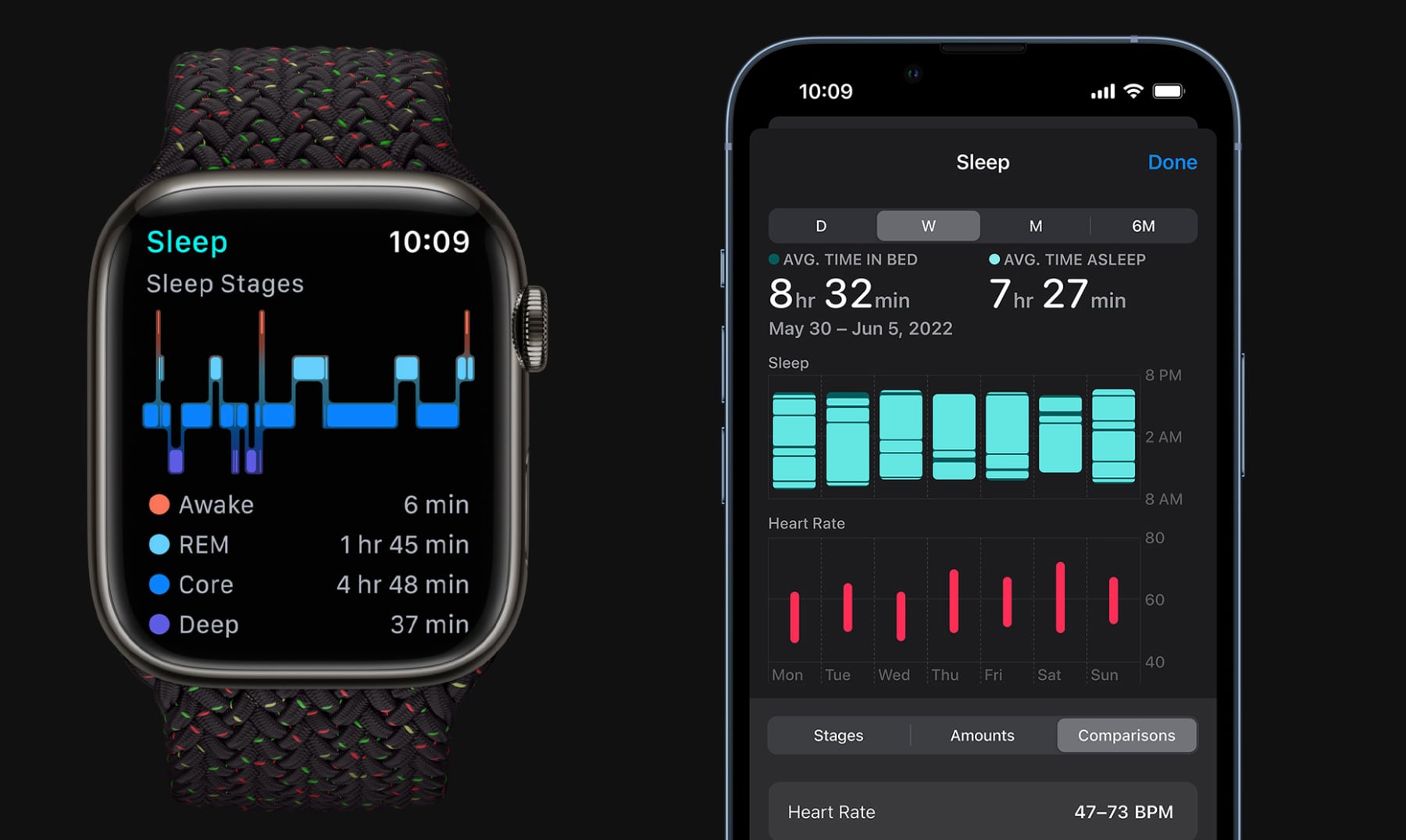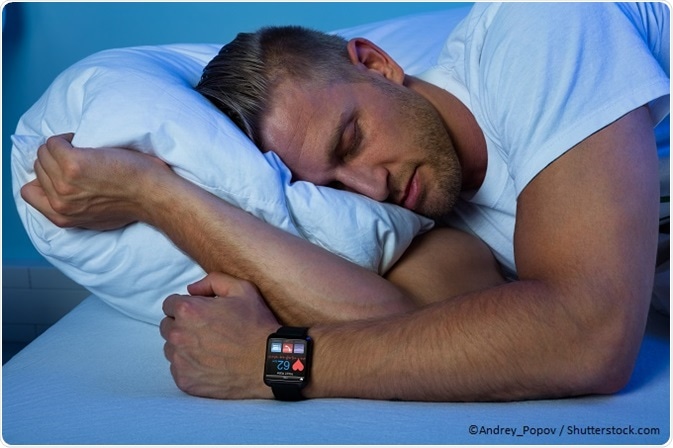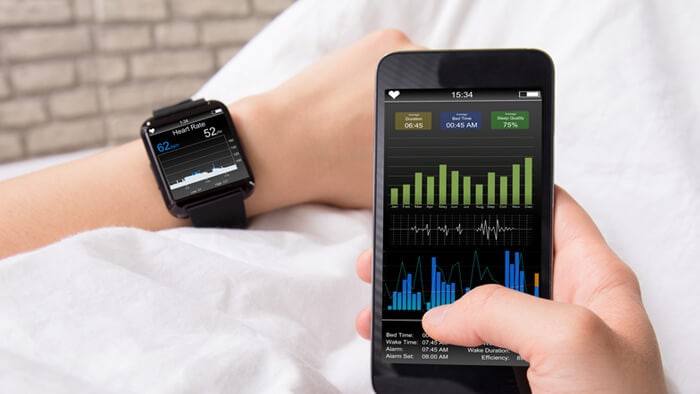How Does a Smartwatch Track Sleep?
Have you ever wondered how your smartwatch knows when you’re asleep or awake? It’s fascinating, isn’t it?
You strap this little device to your wrist, and it somehow manages to track your sleep patterns without you even realizing it. Understanding how a smartwatch tracks sleep can help you maximize its benefits and improve your overall well-being. Imagine waking up refreshed and ready to tackle the day because your smartwatch helped you optimize your sleep.
You’ll discover the simple yet powerful technology behind sleep tracking in smartwatches and how it can change the way you rest. Dive in to unlock the secrets of better sleep and smarter living.
Sleep Tracking Technology
Smartwatches have transformed the way we understand our sleep patterns. By wearing a small device on your wrist, you can gain insights into your nightly rest. But how does this technology actually work? Understanding sleep tracking technology helps you make the most of your smartwatch. Let’s dive into the key components that make it tick.
Sensors Used
Smartwatches use a variety of sensors to monitor your sleep. The most common are accelerometers, which detect movement. They track how much you toss and turn during the night.
Some advanced models include heart rate sensors. These help assess the different stages of sleep by monitoring your heart rate variability. A steady heart rate might indicate deep sleep, while fluctuations could suggest lighter sleep stages.
Newer devices might also feature SpO2 sensors. These measure blood oxygen levels, providing insights into potential sleep apnea. This data can be crucial for improving sleep quality and overall health.
Data Collection Methods
Smartwatches collect data continuously throughout the night. They store this information in real-time, ready for analysis the next morning. But how do they present this data to you?
Most devices sync with a dedicated app on your smartphone. This app visualizes your sleep patterns, breaking down your sleep stages into graphs and charts. It’s like having a personal sleep coach on your wrist.
Your device might also offer sleep recommendations. These could be simple tips to improve your sleep hygiene or more personalized insights. Do you find yourself waking up groggy? The data might suggest going to bed earlier or adjusting your sleep environment.
Have you ever wondered why some nights feel more restful than others? Your smartwatch might hold the answer. With precise sensors and detailed data collection, it opens a window into your nightly habits, guiding you toward better rest.

Credit: visapoint.travel
Stages Of Sleep
Understanding sleep stages helps smartwatches track sleep better. Sleep has different stages, each with unique patterns. Two main stages are REM and Non-REM sleep. Knowing these stages offers insights into sleep quality and health.
Rem Sleep
REM stands for Rapid Eye Movement. During REM sleep, eyes move quickly under the eyelids. This stage is crucial for dreaming. The brain is active, similar to when awake. Heart rate and breathing can speed up. Smartwatches detect REM by monitoring movement and heart rate changes.
Non-rem Sleep
Non-REM sleep has three phases. The first phase is light sleep. Here, the body relaxes but can wake easily. The second phase sees heart rate slow down. The third phase is deep sleep. Muscles repair and growth hormones are released. Smartwatches track these phases by sensing body stillness and heart rate patterns.
Accuracy Of Sleep Data
Smartwatches have revolutionized how we monitor our sleep, but you might wonder, just how accurate is the data they provide? Understanding the precision of sleep tracking can help you make informed decisions about your sleep habits. While technology has come a long way, several factors can influence the reliability of the sleep data your smartwatch captures.
Factors Affecting Accuracy
Did you know that the accuracy of sleep data can vary based on several factors? The position of your smartwatch is crucial. If it’s too loose or worn incorrectly, it might not capture your movements accurately. The algorithms used by different brands also play a significant role in determining how well your sleep is tracked. Some may offer better insights than others. Additionally, external factors like room temperature or noise can disrupt your sleep, affecting the data recorded.
Have you ever questioned the accuracy of your smartwatch when you wake up feeling tired despite a full night’s sleep? This might be because smartwatches primarily track movement and heart rate, which don’t always reflect the quality of your sleep. Consider how your unique sleep patterns and habits might impact the accuracy of your smartwatch data.
Comparing With Other Devices
When comparing smartwatches to other sleep-tracking devices, you might find surprising variations in accuracy. Smartwatches are convenient, but are they as reliable as dedicated sleep trackers that you place under your mattress or pillow? These specialized devices often measure more parameters, providing a more detailed analysis of your sleep stages.
Think about the last time you used a sleep tracking app on your phone. Did it seem more or less accurate than your smartwatch? Many users find dedicated sleep trackers to be more precise because they use more sensors and are less dependent on wrist movement. However, smartwatches offer the advantage of convenience and can be a great tool for everyday use.
What matters most to you when it comes to tracking sleep? Is it the convenience of wearing a smartwatch, or the detailed analysis from a specialized device? Understanding the strengths and limitations of each can help you choose the right tool for your needs.
Benefits Of Sleep Tracking
Smartwatches have transformed how we monitor our sleep. They provide detailed insights that can enhance our health. Sleep tracking offers many advantages that can improve your daily life. Understanding these benefits can help you make informed choices.
Improving Sleep Patterns
Tracking sleep helps identify patterns and irregularities. This data can highlight issues like insomnia or restlessness. By analyzing your sleep, you can find ways to improve it. Better sleep leads to more energy and focus during the day. Consistent patterns can also enhance mood and productivity.
Health Monitoring
Sleep tracking offers a glimpse into your overall health. Poor sleep can signal health problems like stress or heart issues. Smartwatches monitor heart rate and breathing during sleep. They provide valuable health metrics that can guide lifestyle changes. Early detection of sleep-related issues can lead to timely medical advice.
Privacy Concerns
Smartwatches offer detailed sleep tracking features, attracting many users. But privacy concerns arise with the collection and use of personal data. Users often wonder how their sleep data is protected and managed.
Data Security
Ensuring data security is crucial. Smartwatch manufacturers use encryption methods to protect sleep data. Encryption helps keep personal information safe from unauthorized access. Still, concerns about data breaches persist.
Many users fear potential hacking incidents. Such breaches could expose sensitive sleep patterns. Manufacturers regularly update security protocols to counter these threats. Yet, the risk is never entirely eliminated.
User Consent
User consent is vital in sleep tracking. Before collecting sleep data, smartwatches ask for permission. This ensures users are aware of what data is collected. Users have the option to decline data sharing.
Sometimes, consent forms can be lengthy. Users might skip reading them and miss critical information. It’s essential to understand what data is shared and how it’s used.
Transparency in data usage builds trust. Users should feel comfortable with how their information is handled. Knowing rights and options is key to informed consent.

Credit: www.news-medical.net
Future Of Sleep Tracking
Smartwatches track sleep using sensors that monitor movement and heart rate. They analyze sleep patterns, identifying stages like deep and REM sleep. Data helps users understand sleep quality and improve rest.
The future of sleep tracking is an exciting frontier, promising to transform how you monitor your rest and, ultimately, your health. With rapid advancements in technology, smartwatches are becoming more sophisticated, providing insights that were once only possible with specialized equipment. Imagine waking up and not just knowing how long you slept but understanding the quality of your rest and how to improve it.Advancements In Technology
Recent technological advancements have significantly enhanced the capabilities of sleep tracking features in smartwatches. Nowadays, these devices can monitor your heart rate, movements, and even oxygen levels with remarkable accuracy. I remember my first smartwatch, which simply tracked how long I stayed in bed. Now, my latest model provides detailed sleep stages, such as REM and deep sleep. This leap in technology allows you to gain a clearer picture of your sleep patterns. You can view data that reveals how well you’re actually resting. This detailed feedback can guide you in making lifestyle changes that improve your sleep quality.Potential Innovations
Looking ahead, the potential for innovation in sleep tracking seems boundless. Imagine a smartwatch that not only tracks your sleep but also gives personalized recommendations on how to enhance it. This could include suggestions on the best sleep environment or tips on calming bedtime routines. Emerging technologies could enable smartwatches to detect sleep disorders early. This early detection could lead to timely interventions, improving your overall health. What if your smartwatch could automatically sync with smart home devices to adjust lighting and temperature for optimal sleep conditions? These innovations could change your nightly rest into a comprehensive wellness strategy. As technology continues to evolve, your smartwatch might soon become your most trusted sleep advisor. Are you ready to embrace these changes and take control of your sleep health? The future holds endless possibilities, and it all starts with a good night’s sleep.
Credit: www.philips.co.nz
Frequently Asked Questions
How Do Smartwatches Detect Sleep Stages?
Smartwatches use sensors like accelerometers and heart rate monitors to analyze your movements and heart rate. This data helps to identify different sleep stages such as light, deep, and REM sleep. By tracking these patterns, smartwatches provide insights into your sleep quality and duration.
Can Smartwatches Accurately Track Sleep Quality?
Smartwatches offer a good estimate of sleep quality by monitoring movement and heart rate. However, they may not be as precise as sleep studies conducted in labs. While they provide valuable insights, factors like device placement and sensitivity can affect accuracy.
What Sensors Do Smartwatches Use For Sleep Tracking?
Smartwatches primarily use accelerometers and heart rate sensors for sleep tracking. Accelerometers detect movement, helping to determine sleep stages. Heart rate sensors monitor variations, offering additional insights into sleep cycles. These combined metrics allow smartwatches to provide comprehensive sleep analysis.
Is It Safe To Wear A Smartwatch While Sleeping?
Yes, wearing a smartwatch while sleeping is generally safe. Most smartwatches are designed with lightweight materials and low radiation levels. They are comfortable to wear overnight, allowing continuous monitoring of your sleep patterns without posing significant health risks.
Conclusion
Smartwatches make sleep tracking easy and insightful. They monitor movements. They detect heart rates. This helps in understanding sleep patterns. Knowing how you sleep can improve your health. Smartwatches give you valuable data. You can adjust your routines with this information.
Better sleep leads to better days. Technology simplifies tracking. Understanding sleep is now more accessible. Smartwatches provide simple solutions for complex problems. A small device with big benefits. Sleep better, live better.
